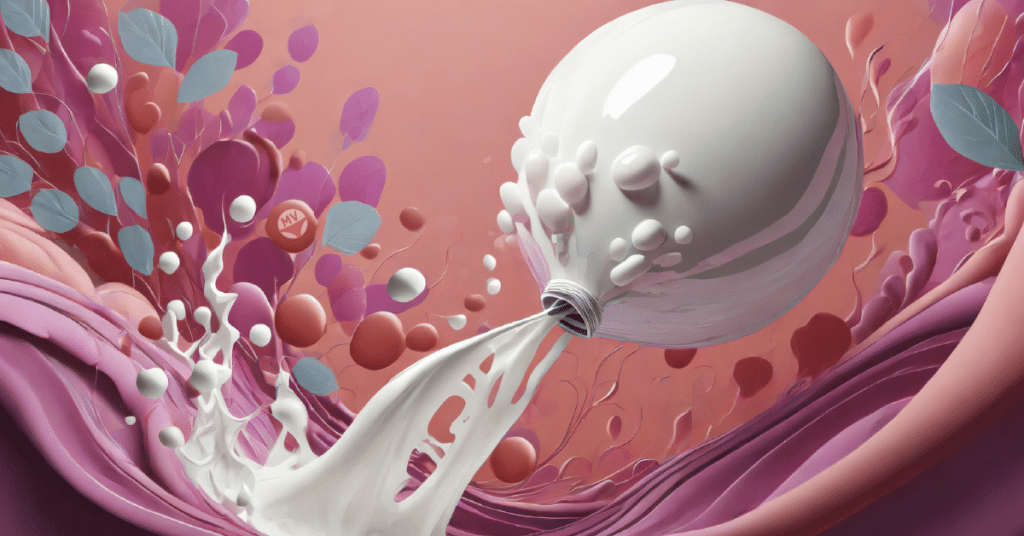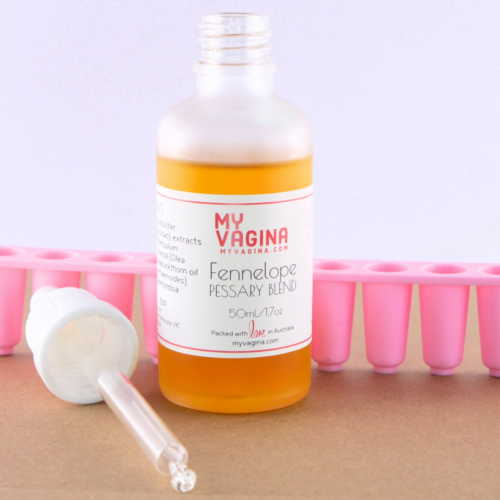Estrogen is incredibly high during pregnancy, contributing to the baby’s development and the creation of the milk ducting system.
As soon as the baby is out, estrogen levels plummet to near menopausal levels, which leaves room for the milk-producing hormone, prolactin, to take over.
Prolactin levels stay high during nursing. However, estrogen levels tend to stay low for longer, which can cause some unexpected and unpleasant vaginal and pelvic floor symptoms.
High prolactin means low estrogen
Low estrogen can result in a dry vagina, low libido, and pelvic floor laxity/weakness and may prevent the return of normal menstruation. It can also result in vaginal microbiome disturbances, as estrogen stimulates glycogen in vaginal cells, which is food for protective lactobacilli species.
Lactobacilli species are desirable vaginal microbes which keep pathogens away via several important mechanisms. If lactobacilli don’t have enough food (energy sources), their numbers will dwindle, leaving room for other microbes to take their place.
The result can be vaginal dysbiosis, such as bacterial vaginosis (BV) or aerobic vaginitis (AV). Symptoms can include odour, discharge, itching, burning and discomfort – the last thing you need while nursing a new baby.
Pelvic floor muscles and tissue may become a little weaker, as the impact of estrogen is strong on this area of the body. Be gentle with your expectations of your body! It’s already doing a lot.
Hormone-free vaginal treatments for low estrogen symptoms
My Vagina offers two excellent all-natural, drug free, hormone free, soothing pessaries that have a gentle estrogenic effect on vaginal tissue without affecting systemic hormone levels.
Studies3,4 show that fennel has activity when used vaginally to increase the function and thickness of vaginal epithelial cells. What this means in real terms is a happier, healthier vagina, less prone to infections and symptoms.
The fennel and pomegranate in our vaginal suppositories promote glycogen production (healthy bacteria food) and strong, resilient vaginal cells. The moisturising effect comes from the sea buckthorn oil, a well-regarded vaginal moisturiser when used both internally and topically.
Recommended treatment is initally, two weeks while you sleep or are lying down for as long as possible, then as needed. If you are up and down with the baby, just use the pessary when you can. If a lot leaks out with gravity, use an extra pessary as needed.
Effective in low oestrogen states - postmenopause, late perimenopause, breastfeeding, trans men with Vs, with use of oestrogen-blocking drugs, and in ovarian insufficiency.
Increasing systemic estrogen levels during lactation with foods
Some foods contain phytoestrogens, which are 200-300 times weaker than human estrogen, thus in a low estrogen state, can provide a weak source of estrogens – which might be better than nothing.
Searchable phytoestrogen-containing foods list1,2
| Plant species (Common name) | μg/100 g dry weight | Levels |
|---|---|---|
| Plum | 5 | Very Low |
| Wheat (white meal) | 8 | Very Low |
| Banana | 10 | Very Low |
| Apple | 12 | Very Low |
| Oatmeal | 13 | Very Low |
| Potato (peeled) | 16 | Very Low |
| Lentil | 23 | Very Low |
| Pea | 27 | Very Low |
| Cabbage | 33 | Very Low |
| Tritacle (meal) | 35 | Very Low |
| Wheat (wholegrain) | 36 | Very Low |
| Cabbage, Turnip-rooted | 43 | Very Low |
| Poppy seed | 51 | Very Low |
| Tritacle (wholegrain, wheat variant) | 52 | Very Low |
| Barley (wholegrain) | 80 | Low |
| Barley bran | 85 | Low |
| Onion | 91 | Low |
| Pistachio nut | 96 | Low |
| Beetroot | 100 | Low |
| Almond | 111 | Low |
| Cauliflower | 111 | Low |
| Rye meal (wholegrain) | 112 | Low |
| Wheat bran | 121 | Low |
| Hazelnut | 123 | Low |
| Paprika | 124 | Low |
| Rasberry | 139 | Low |
| Sharon | 145 | Low |
| Cabbage, Red | 160 | Low |
| Red currant | 165 | Low |
| Walnut | 173 | Low |
| Oat bran | 179 | Low |
| Witloof/Endive | 190 | Low |
| Cloudberry | 203 | Moderate |
| Caraway seed | 235 | Moderate |
| Chickpea/Garbanzo bean | 250 | Moderate |
| Black-eyed pea/Cow pea | 255 | Moderate |
| Cashew nut | 261 | Moderate |
| Rye bran | 299 | Moderate |
| Black gram bean | 361 | Moderate |
| Carrot (skin on) | 370 | Moderate |
| Garlic | 380 | Moderate |
| Kidney bean | 396 | Moderate |
| Black currant | 398 | Moderate |
| Peanut | 420 | Moderate |
| Broccoli | 451 | Moderate |
| American groundnut (potato bean) | 511 | Moderate |
| Pigeon pea | 517 | High |
| Clover seed | 518 | High |
| Zuccini (skin on) | 817 | High |
| Blueberry | 835 | High |
| Sesame seed | 852 | High |
| Cranberry | 1054 | High |
| Strawberry | 1210 | High |
| Lingonberry | 1510 | High |
| Tea, Yellow label tea-bag | 2591 | Very High |
| Sunflower seed | 2600 | Very High |
| Tea, Earl Grey tea (Oriental tea mixture) | 3212 | Very High |
| Kudzu leaf | 3371 | Very High |
| Tea, Pure Lapsang Souchong tea (China) | 3520 | Very High |
| Tea, China Gunpowder | 3672 | Very High |
| Pumpkin (peeled) | 3874 | Very High |
| Tea, Japan Sencha Green tea | 4075 | Very High |
| Tea, Nippon Sencha Green tea | 5565 | Very High |
| Tea, Prince of Wales, tea-bag | 5768 | Very High |
| Tea, China Green tea | 5965 | Very High |
| Tea, Green | 8000 | Very High |
| Black tea | 8500 | Very High |
| Soy bean | 88843 | Extremely High |
| Kudzu root | 197631 | Extremely High |
| Flaxseed | 370987 | Extremely High |
| Flaxseed (crushed) | 547300 | Extremely High |
Vaginal hormone therapy
Your doctor may prescribe a vaginal estrogen cream. Talk to your practitioner about your symptoms and their recommended treatment.
References
- 1.Bacciottini L, Falchetti A, Pampaloni B, Bartolini E, Carossino A, Brandi M. Phytoestrogens: food or drug? Clin Cases Miner Bone Metab. 2007;4(2):123-130. https://www.ncbi.nlm.nih.gov/pubmed/22461212
- 2.Mazur W, Adlercreutz H. Naturally occurring oestrogens in food. Pure and Applied Chemistry. Published online September 1, 1998:1759-1776. doi:10.1351/pac199870091759
- 3.Ghazanfarpour M, Shokrollahi P, Khadivzadeh T, et al. Effect of Foeniculum vulgare (fennel) on vaginal atrophy in postmenopausal women: A double-blind, randomized, placebo-controlled trial. Post Reprod Health. Published online October 8, 2017:171-176. doi:10.1177/2053369117733629
- 4.Yaralizadeh M, Abedi P, Najar S, Namjoyan F, Saki A. Effect of Foeniculum vulgare (fennel) vaginal cream on vaginal atrophy in postmenopausal women: A double-blind randomized placebo-controlled trial. Maturitas. Published online February 2016:75-80. doi:10.1016/j.maturitas.2015.11.005
Get a fresh perspective with a qualified, experienced vulvovaginal specialist naturopath.
This product has multiple variants. The options may be chosen on the product pageThe most comprehensive vaginal microbiome test you can take at home, brought to you by world-leading vaginal microbiome scientists at Juno Bio.
Easy-to-use BV and AV treatment program.
Promote and support a protective vaginal microbiome with tailored probiotic species.







